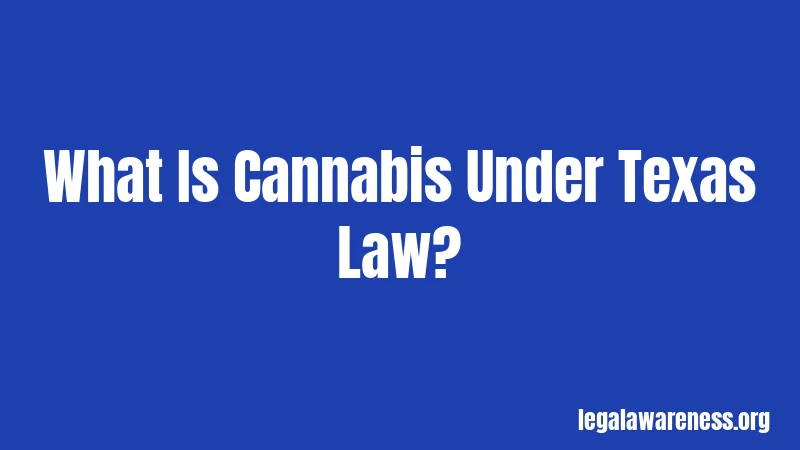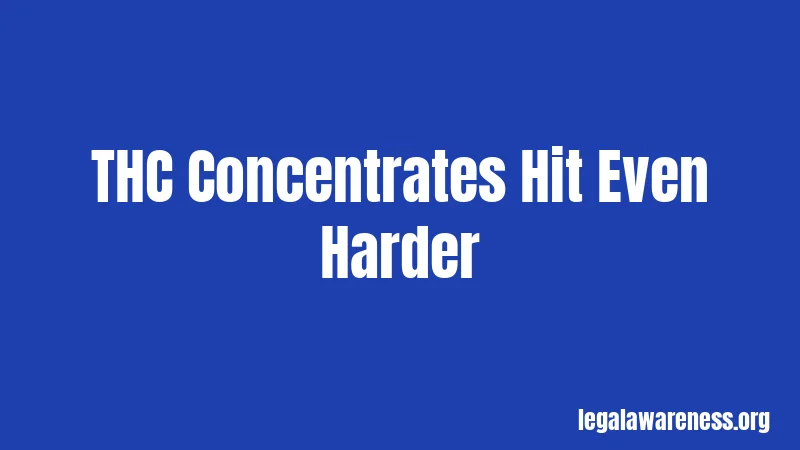Cannabis Laws in Texas (2026): The Rules Are Stricter Than You Think
Most people assume cannabis is basically legal everywhere now. Right? Well, not in Texas. The Lone Star State has some of the toughest marijuana laws in the country. And the penalties? They can hit hard. Let’s break down exactly what you need to know to stay out of trouble.
Here’s the deal. While other states have embraced legalization, Texas remains firmly opposed to recreational cannabis. But there’s a twist. The state has expanded its medical program, some cities have decriminalized possession, and hemp-derived products exist in a weird legal gray area. Confusing? Totally. That’s why we’re going to walk through everything step by step.
What Is Cannabis Under Texas Law?

Cannabis includes marijuana, THC products, and hashish. Here’s where it gets tricky though. Texas treats different forms of cannabis very differently under the law.
Marijuana flower is one thing. THC concentrates are another. And honestly, the differences matter more than you’d think. The state defines marijuana as the cannabis plant with more than 0.3% THC content. Anything above that threshold is illegal for recreational use.
Now here’s the kicker. Hemp-derived products with Delta-8 or Delta-9 THC? Those exist in stores all over Texas. They’re technically legal under federal law. But state officials are fighting to ban them. We’ll get to that mess in a bit.
Basic Possession Laws
Okay, pause. Read this carefully.
Possessing any amount of marijuana is illegal in Texas. Yep, even a tiny bit. There’s no minimum amount you can legally carry.
Let me break down the penalties by weight.
Less than 2 ounces: This is a Class B misdemeanor. You could face up to 180 days in jail. The fine can go up to $2,000. Pretty serious for what many states consider no big deal.
Between 2 and 4 ounces: Class A misdemeanor. Now we’re looking at up to one year in jail and fines up to $4,000.
Between 4 ounces and 5 pounds: This jumps to a felony. State jail felony, specifically. That means 180 days to two years in prison. Fines can reach $10,000.
Between 5 and 50 pounds: Third-degree felony. Two to ten years in prison. Still a $10,000 maximum fine.
Between 50 and 2,000 pounds: Second-degree felony. We’re talking two to 20 years in prison. Fine stays at $10,000.
More than 2,000 pounds: First-degree felony. This is the big one. Five to 99 years in prison. Fines up to $50,000.
Sound harsh? It is. Texas doesn’t mess around with marijuana possession.
THC Concentrates Hit Even Harder

Wait, it gets worse.
THC concentrates, vapes, edibles, and hashish aren’t classified as marijuana in Texas. Instead, they fall under Penalty Group 1. That’s the same category as cocaine and heroin.
Hold on, this part is important.
Even the tiniest amount of a THC vape cartridge is a felony. Not a misdemeanor. A felony. Here’s how it breaks down:
Less than 1 gram: State jail felony. That’s 180 days to two years in prison. Fine up to $10,000.
Between 1 and 4 grams: Third-degree felony. Two to 20 years in prison. Fine up to $10,000.
Between 4 and 400 grams: Second-degree felony. Five to 99 years in prison. Fine stays at $10,000.
More than 400 grams: You could get life in prison. Fines up to $100,000.
So basically, that little THC gummy you bought at a gas station? If it’s illegal, you’re looking at the same charges as if you had hard drugs. Makes sense, right? Actually, it doesn’t. But that’s the law.
Selling and Distribution
Selling marijuana is obviously illegal. But the penalties vary wildly based on amount.
7 grams or less as a gift: Class A misdemeanor. Up to one year in jail. Fine up to $2,000. Notice it says “as a gift.” If you’re charging money, penalties increase.
7 grams or less for sale: Still a misdemeanor, but now you’re looking at up to one year in jail and a $4,000 fine.
Between 7 grams and 5 pounds: State jail felony. Minimum 180 days, up to two years. Fine reaches $10,000.
Between 5 and 50 pounds: Second-degree felony. Two to 20 years in prison.
More than 50 pounds: The penalties just keep escalating from there.
Selling to someone under 18? That’s automatically a second-degree felony with a mandatory minimum of two years. Using social media to facilitate drug sales also increases penalties.
Growing Cannabis at Home

Not a chance.
Texas has zero tolerance for home cultivation. Growing even a single plant is illegal. The penalties are based on the total weight of the plants found.
Wait, here’s how they calculate it. They pull off the roots, weigh the plant, then count one-sixth of that weight as the “aggregate weight.” Then you face the same possession penalties based on that weight.
One plant could potentially produce up to 32 ounces of marijuana. That’s about 6.4 ounces of dried, smokable product. Which means you’d be looking at felony charges for a single plant.
Medical Cannabis Through the Compassionate Use Program
Alright, now for some slightly better news.
Texas does have a medical cannabis program. It’s called the Texas Compassionate Use Program, or TCUP. But honestly, it’s super restrictive.
Who qualifies? You need to have one of these conditions:
- Epilepsy
- Multiple sclerosis
- Autism
- Cancer (all forms)
- Post-traumatic stress disorder (PTSD)
- Chronic pain
- Traumatic brain injury
- Crohn’s disease
- Terminal illness
- Anyone receiving hospice or palliative care
What products are allowed? Low-THC cannabis oil only. As of 2025, the THC limit increased to 10 milligrams per dose and one gram per package. That’s up from the previous 1% limit.
What forms can you use? Tinctures, topicals, patches, lotions, suppositories, and inhalable devices like vaporizers and inhalers. Still no smoking flower though.
How many dispensaries? Only three served the entire state until 2025. Now the Department of Public Safety is issuing 12 new licenses. Nine by December 2025, three more by April 2026. That brings the total to 15 statewide.
How long do prescriptions last? Physicians can now prescribe for up to one year with quarterly refills. Used to be just 90 days.
Not sure what counts as a qualifying condition? Check with a registered TCUP physician. The Compassionate Use Registry of Texas (CURT) can help you find one near you.
Hemp-Derived Products: The Legal Gray Area
Okay, this one’s complicated. Stay with me here.
In 2019, Texas passed HB 1325. This legalized hemp cultivation and products containing less than 0.3% THC. Sounds clear enough. But here’s what happened.
Companies started selling hemp-derived products with Delta-8 THC and Delta-9 THC. These products are technically legal under the 2018 federal Farm Bill. So suddenly, you could buy THC gummies, vapes, and drinks at gas stations across Texas.
Confused about the difference? Here’s the thing. The products claim to stay under the 0.3% THC limit by weight. But when you eat an entire package of gummies? You’re getting way more THC than that.
Conservative lawmakers freaked out. Lieutenant Governor Dan Patrick made banning these products his top priority in 2025. The Texas Legislature passed SB 3 to ban all consumable THC products outside the medical program.
But wait, there’s a twist. Governor Greg Abbott vetoed the bill. He called two special sessions to try regulating these products instead. The legislature couldn’t agree. So Abbott issued an Executive Order telling state agencies to regulate them.
Then federal law jumped in. Congress passed a funding bill in late 2024 banning the sale of hemp products with more than 0.4 milligrams of THC. That takes effect November 2026. So basically, almost all consumable hemp products will be illegal federally.
What does this mean for you right now? Honestly, nobody knows for sure. The Texas Alcoholic Beverage Commission is moving forward with state regulations. But those could conflict with the federal ban.
Pretty much a mess.
Cities That Have Decriminalized Small Amounts
Here’s where things get interesting.
Several Texas cities passed local ordinances to decriminalize marijuana possession. Voters overwhelmingly supported these measures. We’re talking 67-69% approval rates.
Which cities?
- Austin
- Dallas
- Houston
- San Marcos
- Killeen
- Bastrop
- Lockhart
- Elgin
- Denton
- Harker Heights
What do these ordinances do? They tell local police not to arrest or cite people for possessing less than four ounces of marijuana. In most cases anyway. They also ban using the smell of cannabis as probable cause for searches.
Sounds great, right? Well, here’s the catch.
Texas Attorney General Ken Paxton sued multiple cities to block these ordinances. He argues they violate state law. A state appeals court ruled San Marcos’s ordinance was preempted by state law. Then the court overruled Austin’s ordinance, which had been in effect for three years.
Dallas agreed to pause implementation while courts decide. The legal battles continue.
So what’s the bottom line? Even in these cities, marijuana possession is still technically illegal under state law. Local police might not arrest you. But state troopers or other law enforcement absolutely could.
Don’t assume you’re safe just because you’re in one of these cities. The situation is fluid and could change.
Special Circumstances That Increase Penalties
Okay, this one’s probably the most important rule.
Getting caught near a school makes everything worse. Way worse. If you’re within 1,000 feet of a school, playground, or other “Drug-Free Zone,” your charges automatically increase one level.
What does that mean? A Class B misdemeanor becomes a Class A misdemeanor. A Class A becomes a felony. And so on.
Repeat offenses also escalate penalties. Second conviction? Expect enhanced charges and longer sentences.
Driving under the influence of marijuana? That’s treated exactly like an alcohol DUI. Same penalties. Same consequences.
Other Consequences You Might Not Expect
Here’s what most people miss.
Driver’s license suspension: Any drug conviction triggers a mandatory six-month suspension. Even if you weren’t driving. In Texas, losing your license can mean losing your job.
Civil asset forfeiture: Police can seize your cash, car, or property if they believe it’s connected to drug activity. And get this – they can do it even without a conviction. Getting your stuff back is expensive and difficult.
Drug paraphernalia charges: Possessing pipes, scales, or baggies is a separate crime. Usually a Class C misdemeanor with a $500 fine. But it still creates a criminal record.
Employment problems: A drug conviction can cost you your job. Or prevent you from getting hired. Many employers do background checks.
Professional licenses: Doctors, nurses, teachers, lawyers. All can lose their professional licenses over drug convictions.
Federal benefits: Student loans, public housing, and other federal benefits can be affected.
Gun rights: Federal law prohibits anyone “who is an unlawful user of or addicted to any controlled substance” from possessing firearms. Texas DPS says participating in TCUP shouldn’t disqualify you. But your underlying condition might.
The consequences go way beyond just fines and jail time. They can follow you for years.
How to Stay Legal
Trust me, this works.
Don’t possess marijuana recreationally. Simple as that. Texas hasn’t legalized it. Don’t risk it.
Get a TCUP prescription if you qualify. If you have a qualifying medical condition, work with a registered physician. Use only licensed dispensaries.
Be careful with hemp products. The legal status is uncertain. Products sold in stores might become illegal soon. If you’re going to use them, understand the risk.
Know your city’s policies. Research local decriminalization ordinances. But remember – they don’t override state law.
Never drive impaired. Marijuana DUIs carry the same penalties as alcohol. Not worth it.
Don’t use near schools or in Drug-Free Zones. Those enhanced penalties are no joke.
If you’re on probation or parole, abstain completely. Drug tests are mandatory. THC stays in your system for weeks or months.
Wondering if this applies to you? If you’re in Texas and thinking about cannabis, yes. It applies.
What Happens If You Get Arrested
So you got caught. Now what?
First, remain calm. Don’t resist arrest. Don’t consent to searches without a warrant. Ask for a lawyer immediately.
For possession under 2 ounces in Harris County? You might qualify for the Misdemeanor Marijuana Diversion Program. Complete a four-hour drug education class and charges get dismissed. This applies even to repeat offenders.
Travis County has similar programs. A $45 fine and four-hour class for up to 2 ounces. As of 2023, local law enforcement doesn’t pursue charges for under 4 ounces.
But these are local policies. Not guarantees. And not available everywhere in Texas.
If you face charges, hire a criminal defense attorney. Seriously. The stakes are too high to go it alone. A good lawyer can challenge the stop, the search, the evidence. Sometimes they get charges reduced or dismissed entirely.
Never just plead guilty without legal advice. A conviction stays on your record forever.
Recent Changes You Should Know
2025 was a huge year for Texas cannabis policy.
HB 46 expanded medical cannabis: Governor Abbott signed this on June 22, 2025. Texas became the 40th state with a comprehensive medical cannabis program. The changes included more qualifying conditions, higher THC limits, and more dispensaries.
Federal hemp restrictions coming: The funding bill Congress passed bans hemp products with more than 0.4 milligrams of THC. Takes effect November 2026. This will essentially criminalize most consumable hemp products sold in Texas.
Cities continue to decriminalize: Dallas, Bastrop, and Lockhart all passed decriminalization measures in November 2024. But legal challenges from the state continue.
HB 1208 proposed recreational legalization: State Rep. Jessica González filed a bill to legalize recreational marijuana for adults 21 and over. Up to 2.5 ounces for personal use, 10 ounces at home. A 10% sales tax would generate state revenue. But the bill faces strong opposition from conservative leaders like Lieutenant Governor Dan Patrick.
Will recreational cannabis ever be legal in Texas? Maybe eventually. Public support is growing. But don’t hold your breath. Conservative leadership remains firmly opposed.
Frequently Asked Questions
Is medical marijuana legal in Texas? Yes, but only through the Texas Compassionate Use Program. You need a qualifying medical condition and a prescription from a registered physician. Products must contain no more than 10 milligrams of THC per dose.
Can I get arrested for a small amount of weed? Yes. Any amount of marijuana possession is illegal in Texas. Even less than 2 ounces can get you up to 180 days in jail and a $2,000 fine.
Are THC gummies and vapes legal in Texas? It’s complicated. Hemp-derived products with Delta-8 or Delta-9 THC are in a legal gray area. They’re technically legal under federal law but face state bans. Federal restrictions taking effect in 2026 will likely make them illegal. THC products not derived from legal hemp are absolutely illegal and carry felony charges.
What cities in Texas have decriminalized marijuana? Dallas, Austin, Houston, San Marcos, Killeen, Bastrop, Lockhart, Elgin, Denton, and Harker Heights have passed decriminalization ordinances. But the state is suing several of these cities, and the legal status remains uncertain.
Can I grow cannabis at home for personal use? No. Growing any amount of cannabis is illegal in Texas. Even one plant can result in felony charges based on the plant’s weight.
Final Thoughts
Now you know the basics. Texas cannabis laws are strict, confusing, and changing rapidly. The state remains one of the most conservative on marijuana policy.
Here’s my honest take. The medical program is expanding, which helps patients who genuinely need it. But recreational use is still heavily criminalized with harsh penalties. The hemp product gray area creates unnecessary confusion and legal risk.
If you use cannabis in Texas, understand the real consequences. A conviction can impact your life for years. Jobs, housing, licenses, even your freedom are at stake.
Stay informed, stay safe, and when in doubt, consult a lawyer. The laws might seem outdated to many people, but they’re still enforced aggressively across most of Texas.
References
- Texas Health and Safety Code § 481.121 – Possession of Marihuana
- Texas Compassionate Use Program – Department of Public Safety
- NORML – Texas Laws and Penalties
- Marijuana Policy Project – Texas Cannabis Policy Updates 2025
- TexasCannabis.org – Medical Cannabis Expansion Bill
- Texas State Law Library – Cannabis & the Law Guide
- Texas Tribune – Hemp Regulation Proceedings
